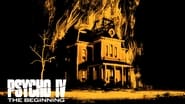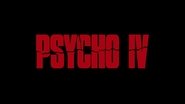zenbop
Having seen the original Psycho in the theater years back.Of course the original in black and white is the greatest Psycho movie. So now this 90s edition is so bad it is unintentionaly funny in places it should be scary. A whole lot of sensous sex going on in this swamp ass version and the inclusion oftalk teradio talk show theme thread in t he movie is done well. Not a very long movie so you wont spend too much time here. Oh, Anthony Perkins , looking very older is center to the movie. Any Psycho film without Anthony Perkins is a weak Psycho flick.
Desertman84
Anthony Perkins once again reprises his most famous role in the last film of the Psycho franchise entitled "Psycho IV: The Beginning".Olivia Hussey,CCH Pounder and Henry Thomas co-stars with him in this TV movie that serves the final film of the Psycho film series.The screenplay written by the original scriptwriter of the original film Joseph Stefano tells us the story of the young Norman Bates and how he grew up with his infamous "Mother" that led him into becoming what he is. The movie starts when Norman Bates just got released from the mental institution.He is now married to a psychiatrist and expecting a child.He becomes an anonymous caller to a radio station in a program by Dr.Richmond while discussing the topic "matricide".As the caller "Ed", Norman get to tell the story of his life when he was young while growing up with his mother Norma Bates and how his upbringing led him into becoming what he became to be psychologically and the psychotic killer that he became to be.No question that this TV movie was more of both a prequel and a sequel to the Hitchcock film as it completely disregards the events of Psycho II and Psycho III.The character Emma Spool was not taken into consideration.While some fans of the film franchise would probably not like it,I personally felt that this film never took a shortcut into highlighting "mother" and the negative effect she brought to Norman psychologically rather than taking the responsibility away from her.Added to that,it also brings more consideration to the events of the original 1960 film which was definitely the masterpiece of the film franchise.Despite of it,I think that I could forgive it for doing that being a wonderful film that it is.As for being a slasher flick just like the third film (Psycho III),I think that it did well as we get to see the notoriety of Norman when he begins to kill again.The performances were definitely outstanding especially Perkins as Norman and surprisingly Hussey as Norma or "Mother". Special credit should also be given to Henry Thomas as the young and naive Norman. Finally,the movie did well in providing a closure to Norman's character to provide a fitting conclusion to the film and the film franchise itself.
James Hitchcock
It is a received idea of film criticism that sequels are (subject to a few recognised exceptions such as "Godfather II") never as good as the original film and that the more sequels a film generates the weaker they will become. The first three episodes in the "Psycho" series seem to bear out this received idea. Alfred Hitchcock's 1960 "Psycho" is, with justification, regarded as one of the great classics of the cinema. Richard Franklin's "Psycho II" is no classic, but it is at least a watchable thriller in its own right. "Psycho III", directed by its star Anthony Perkins, is quite honestly a horrid mess, a film that achieves the difficult feat of being gruesome without being in the least scary. I therefore had no great hopes for "Psycho IV: The Beginning", which was made as a television movie as "Psycho III" had been a financial flop. In the event, I was to be pleasantly surprised. You might have thought that, after the mayhem committed by Norman Bates in the second and third films, he would have been locked up and the key thrown away, and that he would never have been released again, no matter how many psychiatrists could be found to pronounce him sane. It therefore comes as some surprise to see him free at the beginning of this film. The reason is that the scriptwriter Joseph Stefano, who also wrote the screenplay for Hitchcock's original, disliked episodes II and III and, unusually for the writer of the fourth entry in a franchise, felt at liberty to ignore the second and third instalments completely. There is therefore no mention of Norman's supposed aunt Emma Spool or of the crimes Norman committed in those films. Norman's father dies after being stung by bees; he is not murdered by Emma, which is the explanation given for his death in "Psycho II". This film, therefore, should be seen as an alternative sequel to Hitchcock's, not a sequel to "Psycho III". It also serves as a prequel because it contains flashbacks to events which occurred before the events of the original. Another link with Hitchcock's film is the use of the original theme music by Bernard Herrmann. One element Stefano does borrow from earlier episodes is "Norma", the Christian name given to Norman's mother in "Psycho II"; in the original she is simply referred to as "Mrs Bates". The suggestion is that Norman has been named after his mother by receiving a masculine version of her name. This is an unusual way of naming a boy- it is much more common for boys to be named after their fathers or other male relatives- and the similarity between their names may have been intended to symbolise Norman's confusion between his mother and himself. The framework for the film is provided by a radio talk show where the host is discussing the topic of matricide with her guest Dr. Richmond, Norman's former psychologist. Norman calls the show, using an alias to tell his story, which is told in a series of flashbacks. We get to see for the first time how he murdered his mother and her lover, Chet Rudolph. Another plot line concerns Norman's wife Connie, who is pregnant, and his fears that the unborn child will grow up to inherit his madness. One of the weaknesses of "Psycho III" was that there were no acting performances of any real merit other than that from Perkins himself. "Psycho IV" is much better in this respect. We get to see Norma Bates for the first time, and she was not a bit like the woman I had envisaged. After seeing "Psycho" I had always envisaged her as a monstrous old harridan, fiercely narrow-minded and puritanical. The character played by Olivia Hussey (perhaps best-known as Zeffirelli's Juliet) is very different, an attractive but obviously troubled young woman, suffering from some kind of mental illness, possibly schizophrenia. Left widowed at an early age, she is at times a loving and affectionate mother to her only son, but at others can be either over-familiar or cruelly abusive, locking him in a cupboard or forcing him to dress as a girl. She can be prudish where sex is concerned, but can also behave in a seductive way with her boyfriend Chet. Chet himself takes a dislike to Norman, whom he finds insufficiently manly, and takes any opportunity to humiliate him. There is another good performance from Henry Thomas as the young Norman, a sensitive and lonely youngster. His own mental troubles are partly due to his genetic inheritance and partly to his strange upbringing. He is good-looking and attractive to girls, but because of his mental issues finds himself unable to relate to them. Perkins clearly wanted to arouse pity and sympathy for Norman, not merely depict him as an abhorrent monster, and with Thomas's assistance he succeeds in this aim here far better than he did in "Psycho III". In fact, I liked the "prequel" flashbacks more than I did the "sequel" part of the film. The radio phone-in framework struck me as a bit of a gimmick, and the scenes involving Connie are not very memorable. The scenes of Norman's early life, however, are gripping, and I felt that they achieved the rare feat for a sequel of adding something to our understanding of the original film. 6/10
Rainey Dawn
Psycho IV is the perfect finale to the film series. We are able to get the entire back-story on Norman Bates. For the first three movies, insight was given (revealed) about Norman but the insight given still left the viewers with more questions about him. "What was up with Norman's mother?" "Who was Norman's mother?" "What was Norman's mother really like?" "What was it that drove Norman so crazy, so psycho?" - all these questions that fans have wondered will be finally answered in the fourth film: Psycho IV: The Beginning (1990).For those that have never seen one of the psycho films, you should watch them in order to build suspense towards the fourth movie "Psycho IV: The Beginning (1990)".The rating on this movie is entirely to low and has unfair bad criticism in my opinion. It's a good finale.9/10






